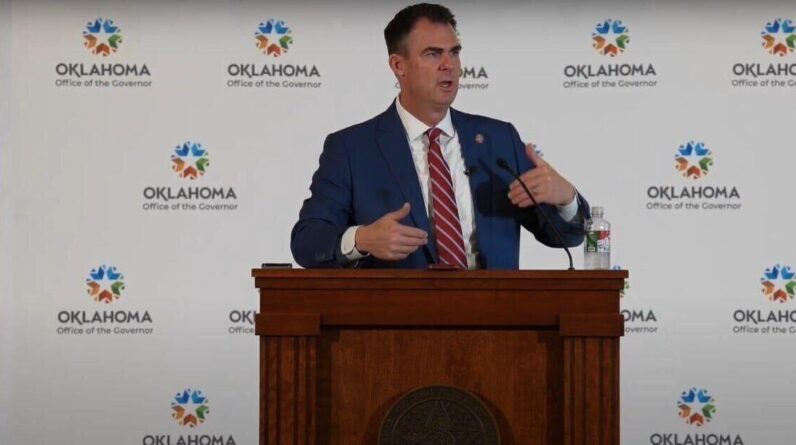
Following Gov. Kevin Stitt’s veto of a bill reauthorizing the state’s public broadcaster for six more years, many locals have expressed support for overriding it.
Stitt recently vetoed House Bill 2820, a routine measure that would have reauthorized the Oklahoma Educational Television Authority through 2029.
At an April 28 press availability, Stitt said the OETA bill is an outdated system.
“It may have had its place in 1957. Why are we spending taxpayers’ money to prop up OETA? It doesn’t make sense to me and then when you look further into the schedule. I don’t think Oklahomans want to use their tax dollars to indoctrinate kids and some of the stuff they’re showing, it just over-sexualizes our kids,” Stitt said.
OETA not only broadcasts educational programming for children and state news, but also allows authorities the ability to transmit emergency alerts through its transmission towers.
“We’re really the only entity in the state that can actually broadcast to all 77 counties, and so we think that partnership is extremely important with law enforcement and public safety,” Bob Spinks, board member of ‘Friends of OETA, he told the Enid News & Eagle.
Many have called on lawmakers to override the governor’s veto.
Among those supporting the override is District 9 state Sen. Dewayne Pemberton, R-Muskogee. Asked if he would vote to override Stitt’s veto, he simply said “yes.”
State Rep. Bob Ed Culver, R-Tahlequah, said he would have to take a look at the bill before making a final decision on it.
“I think [OETA] it serves a very good purpose,” Culver said.
Several Cherokee County residents have taken to social media and urged OETA viewers to contact Culver and Pemberton, as well as the four other people who represent that area, to ask them to vote for the cancellation. Their email addresses, as well as those of other officials, are listed on the state’s website.
During a Saturday, May 8 Facebook forum, Tahlequah Daily Press readers were asked their thoughts on the veto, whether lawmakers should try to override it and whether they agreed with Stitt, what evidence they had of indoctrination in OETA.
“Sesame Street, Mr Roger’s Neighborhood, Bob Ross – I don’t see any indoctrination here [to be honest]” said Tahlequah resident Crystal Coats.
Sandy Stewart Bales, a resident of Tahlequah, was among the few who supported the veto, saying that children should not look at or think about sex or sexual organs at this age.
“The governor. Stitt did a good job on this! It should not be included in television programming through its cartoons”, said Bales.
Area resident Audrey Adair said OETA always has good programming.
“I watch the channel every day and hope the veto is overturned,” Adair said.
Vinita resident Tiffany Cooper said if viewers don’t like what’s on the channel, they can change it or turn off the TV.
“[There’s] they don’t need to dictate what others will see with their taxes that are forcibly placed elsewhere,” Cooper said.
Local Brent Been said the measure is another example of Republicans creating solutions to non-existent problems and believes the veto should be avoided.
“It’s all part of this siege mentality that permeates the Republican Party. And the GOP leadership is very good at feeding the conservative base, whether it’s white replacement theory, smearing socialism, or which they call ‘liberal indoctrination,'” Been said.
John Yeutter, associate professor emeritus at NSU, said several scholars have been credited with the quote, “All great art and literature is propaganda.”
“In this sense, we should expect no education system to be devoid of propaganda or indoctrination,” Yeutter said. “In a similar vein, Secretary [Ryan] Walters proposed Hillsdale College “patriotic training” for history teachers. The important question is rather what message should be taught to our children and whether politicians should make that decision.”
what you said
In a website poll, TDP asked readers how they felt about Stitt’s veto of a popular bipartisan bill to continue partially funding OETA. Slightly more than 13% said they absolutely support the veto and do not watch public television; 6.7% said they supported the veto; and 80% said they were absolutely opposed to the veto. Other options in the poll: somewhat opposed to the veto; they support the veto even as they look at OETA; and uncertain: did not receive votes.
[ad_2]
Source link





